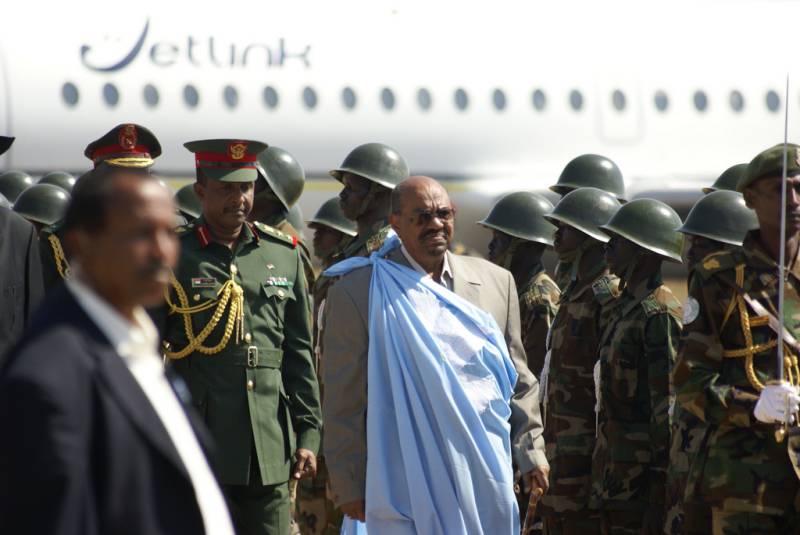Omar al-Bashir left South Africa as a court dragged its feet over whether to stop him.
After days of wrangling to try have him arrested, Sudanese President Omar al-Bashir has left South Africa before a court there could decide whether to arrest him.
The International Criminal Court (ICC) has been trying for years to have Bashir apprehended since charging him with the commission of atrocities against civilians in Darfur, which resulted in the deaths of over 300,000 people. He has flouted the ICC’s arrest warrant since it was issued in 2009, blithely traveling throughout Africa and the Middle East, despite a United Nations Security Council resolution that requires all states to cooperate with the ICC.
There were some signs that this time things might be different. As soon as he arrived in Johannesburg, the South African Litigation Centre submitted an urgent request for his arrest, and ICC Judge Cano Tarfusser emphasized that there was “no ambiguity or uncertainty” to this obligation—something of which the South African authorities were already well aware.
The Gauteng High Court made an interim order that Bashir could not leave South Africa before it reached its decision on enforcing the ICC arrest warrant, but he left the country—just as he fled Kenya in 2011 and Nigeria in 2013, when efforts were made to arrest him.
But his escape from South Africa is not just an individual act of defiance. It is a reminder that, for all the legal obligations binding states to cooperate with the ICC, there is no shortage of opposition to the pursuit of Bashir and his ilk.
Impunity Club
The African Union (AU), the main political forum of African states, has been a growing critic of the ICC’s “intervention” in Africa, and it has passed a number of resolutions on head-of-state immunity since Bashir was indicted—many of them to specifically protect him. In 2009, the AU issued a declaration supporting him, expressing its concern that his indictment could derail the Darfur peace process. This was followed in 2010 with a declaration that it would not cooperate with the ICC to arrest Bashir.
The AU doubled down on those moves in 2011 at the start of the ICC case against Kenyan President Uhuru Kenyatta and his deputy, Williem Ruto, in 2011, declaring immunity for sitting heads of state. This was only compounded by the Kenyan government’s claims that the ICC was being neocolonial and “targeting Africans.”
In 2014, the AU approved the Malabo Protocol, which created an International Criminal Law Section in the African Court to investigate and prosecute international and other crimes, but it still allowed immunity for heads of state and senior government ministers.
The position of the African Union’s anti-ICC countries is that sitting heads of state should not be brought before the ICC until they have left office. But as demonstrated by recent violence in Burundi and the re-election of Bashir, many leaders outstay or extend their constitutional term limits and refuse to leave office unless forced (as was Blaise Compaoré in Burkina Faso).
Another argument these countries make is that sitting heads of state should be immune from ICC arrest warrants in order to carry out their duties at annual meetings and sessions. This broad immunity was rejected by the UK House of Lords in 1999 after the arrest of Augusto Pinochet. The lords ruled that heads of states, or former ones in this case, could not claim diplomatic immunity for atrocities that went against international law, such as torture and genocide.
African Support
Not all African states support the AU position—Botswana is a notable hold-out—and many African civil society groups remain strong advocates for the ICC. African states form one the largest blocs of signatories to the ICC’s Rome Statute—34 countries have signed up. Many Africans hold key positions in the court: the chief prosecutor, Fatou Bensouda, is from the Gambia; there are four African judges; and the president of the Assembly of State Parties is from Senegal. The first conference to review the court’s statute was held in Uganda in 2010.
Given that so many African countries are, in fact, willing participants in the ICC (at least in principle), the AU’s position reflects nothing so much as pure political posturing and cronyism among its leaders.
Although all the cases currently before the ICC do involve African countries, the court is not targeting African leaders; it is trying to deliver justice to African victims where their governments fail to do so. This is based on the core principle of complementarity, under which the ICC only investigates and prosecutes international crimes where governments are unable or unwilling to do so.
During the drafting of the statute of the ICC, African states were some of the most vocal supporters, calling for reparations for victims and the end to impunity for international crimes. Some commentators have pointed out that the ICC has been instrumentalized by states, targeting the losers of the conflict or militia leaders; out of 35 individuals indicted by the ICC, only four were heads of state at the time their arrest warrants were issued.
This is the context in which the Bashir farce played out—and his escape shows just how far the ICC has to go before it can fulfill its core mission.
The ICC was created for exactly these kinds of cases; its whole raison d’être is to end impunity and deliver justice to the victims of international crimes, no matter the political power of perpetrators. But in the case of Darfur, only a few rebel leaders have been brought before the court. In December 2014, the ICC’s chief prosecutor declared that she was no longer pursuing investigations in the country because other states were not enforcing the court’s arrest warrants.
Had Bashir been surrendered to the ICC, it would be a major coup for the court. Other heads of state, such as Ivory Coast’s Laurent Gbagbo, were surrendered to the ICC after being forcibly removed from office, whereas Kenya’s president and vice-president voluntarily went to the ICC and remained in office. Bashir’s arrest would have meant that, no matter how long their tenure or lofty their position, the perpetrators of international crimes could not expect to avoid justice.
Instead, with Bashir at large, the Darfur case looks more stagnant than ever. It was referred to the ICC by the UN Security Council more than ten years ago, but investigators still do not have access to Darfur itself or to the perpetrators they have spent years pursuing.
The ICC’s reliance on the cooperation of states confirms the famous quip from the respected Italian jurist Antonio Cassese that international criminal justice is “a giant without arms and legs.” Yet as cases from Latin America have proven, former dictators need not be allowed to outrun justice, even with protection from international allies and in old age.
Although the ICC can appear powerless, its primary purpose is to vindicate victims of international crimes with state support, leaving perpetrators with nowhere to run—as long as countries don’t choose to protect them for political reasons. That is the moral question South Africa had to grapple with, and by allowing Bashir to get away, it has taken the wrong side. It may be that South Africa finds itself before the UN International Court of Justice for failing to cooperate with the ICC.
*[This article was originally published by The Conversation.] ![]()
The views expressed in this article are the author’s own and do not necessarily reflect Fair Observer’s editorial policy.
Photo Credit: Al Jazeera English / US Navy / Flickr
 We bring you perspectives from around the world. Help us to inform and educate. Your donation is tax-deductible. Join over 400 people to become a donor or you could choose to be a sponsor.
We bring you perspectives from around the world. Help us to inform and educate. Your donation is tax-deductible. Join over 400 people to become a donor or you could choose to be a sponsor.
Support Fair Observer
We rely on your support for our independence, diversity and quality.
For more than 10 years, Fair Observer has been free, fair and independent. No billionaire owns us, no advertisers control us. We are a reader-supported nonprofit. Unlike many other publications, we keep our content free for readers regardless of where they live or whether they can afford to pay. We have no paywalls and no ads.
In the post-truth era of fake news, echo chambers and filter bubbles, we publish a plurality of perspectives from around the world. Anyone can publish with us, but everyone goes through a rigorous editorial process. So, you get fact-checked, well-reasoned content instead of noise.
We publish 2,500+ voices from 90+ countries. We also conduct education and training programs
on subjects ranging from digital media and journalism to writing and critical thinking. This
doesn’t come cheap. Servers, editors, trainers and web developers cost
money.
Please consider supporting us on a regular basis as a recurring donor or a
sustaining member.
Will you support FO’s journalism?
We rely on your support for our independence, diversity and quality.








Comment